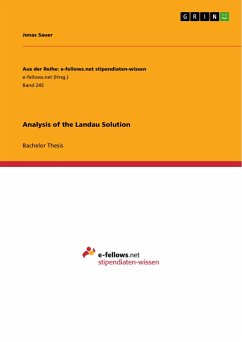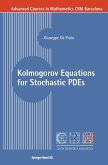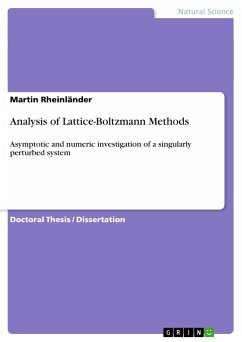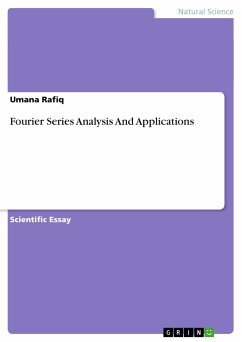Bachelor Thesis from the year 2010 in the subject Mathematics - Analysis, grade: 1,0, Technical University of Darmstadt, language: English, abstract: In 1944 Lev D. Landau found a non-trivial solution to a stationary Navier-Stokes flow on R³, which was symmetric around some axis and fulfilled the condition, that the velocity decayed linearlyand the pressure quadratically in x , depending on a parameter -1 < d < 1 uniquely determined by the force acting on the fluid.Landau was examinating this flow model when considering the following physical experiment. Imagine a thin pipe in a fluid without any boundary conditions. The fluid is driven by a small jet outflowing the pipe. If one looks at the limit case, where the diameter of the pipe shrinks to zero, there is no force acting on the fluid on R³. Nevertheless, if one wants to describe the physical behaviour of the fluid completely, one has to take into account the force acting at the origin, i.e. at the orifice of the pipe. Therefore, onehas to extend the solution in a suitable manner to the whole space R³. This can be done if one admits also weak solutions in the space of distributions.When looking at the solutions found by Landau, it seems quite natural to ask, if there are also reasonable physical interpretations for the case d greater or equal to 1. Therefore we first derive Landau's solution with the assumptions posed in the beginning, following an ansatz by Batchelor. From there it will be clear, that thevelocity is unbounded on a cone, if d > 1. As it turns out, such a modified Landau solution is no longera solution to a Navier-Stokes system - clearly not in the classical, but as well neither in the weak nor veryweak sense. If d = ±1, the velocity will be unbounded on the half line x1 = x2 = 0, ±x3 0.In this case, we have a bit more insight in the behaviour of the modified Landau solution, yet still no physically reasonable interpretation can be given in the whole space R³. In any case, one can consider modified Landau solutions to be solutions in certain subsets of R³, where they yield some interesting streamline plots, which are also provided in this thesis. Furthermore, we give an overview over known results concerning the Landau solution.
Hinweis: Dieser Artikel kann nur an eine deutsche Lieferadresse ausgeliefert werden.
Hinweis: Dieser Artikel kann nur an eine deutsche Lieferadresse ausgeliefert werden.








